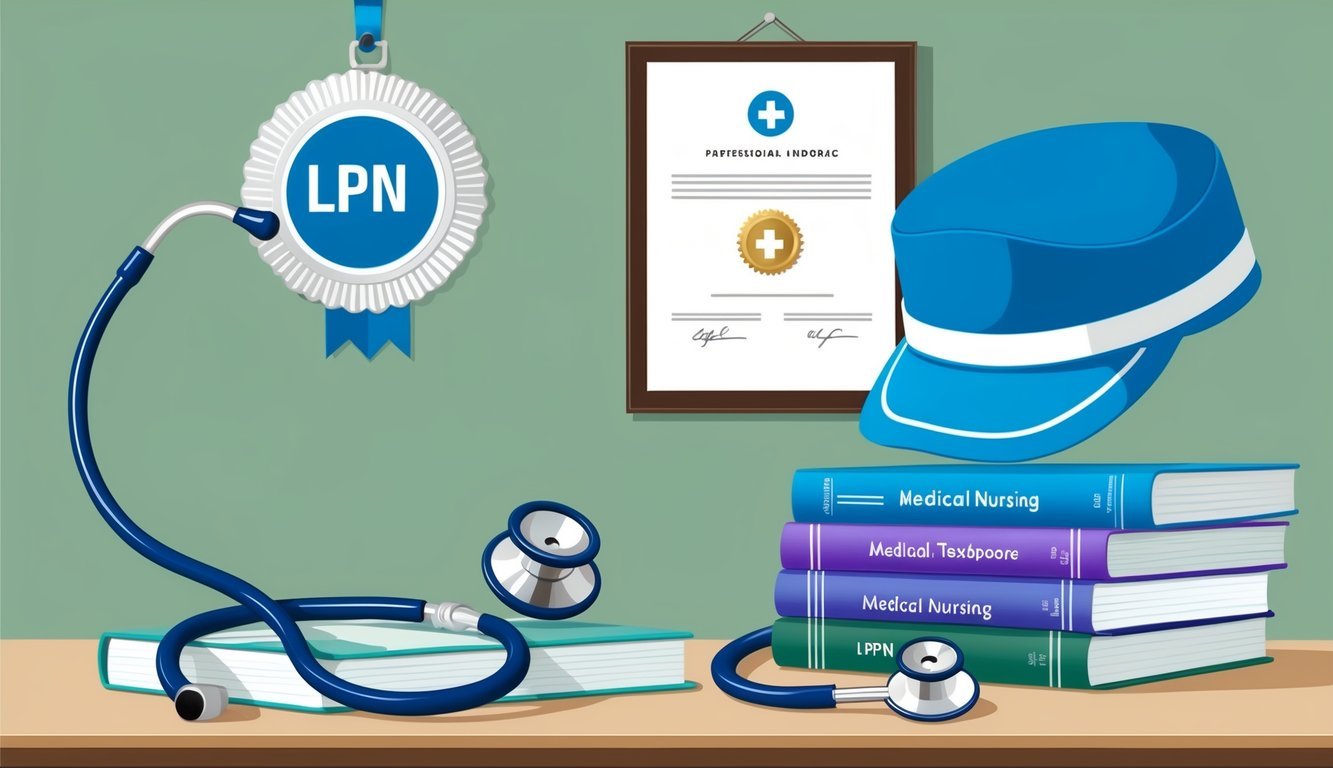Becoming a Licensed Practical Nurse (LPN) is an excellent choice for those seeking a fulfilling career in healthcare.
To become an LPN, you need to complete an accredited practical nursing program and pass the NCLEX-PN exam.
This pathway allows you to provide essential medical care and support to patients under the supervision of Registered Nurses (RNs) and doctors.
As a Practical Nurse, you will engage in various responsibilities, including monitoring patient health, providing basic care, and assisting in medical procedures.
This role not only offers stable employment opportunities but also serves as a stepping stone toward furthering your nursing career, such as transitioning to a Registered Nurse (RN).
To embark on this rewarding journey, it is crucial to research accredited programs and understand the required steps for licensure.
You can find more information on how to get started by visiting resources like NursingWorld, which provides detailed guidance on becoming an LPN.
With dedication and the right preparation, you can take the first steps toward a successful nursing career.
Understanding the Role of an LPN
As a Licensed Practical Nurse (LPN), you play a critical role in patient care within various healthcare settings.
It’s essential to understand your daily responsibilities, the distinctions between LPNs, LVNs, and RNs, as well as your career outlook and opportunities in this field.
Daily Responsibilities and Work Environment
In your role as an LPN, daily responsibilities include monitoring patient health, administering medications, and providing basic care.
You will perform essential tasks such as:
- Assisting with daily living activities (bathing, dressing)
- Collecting patient vital signs
- Changing dressings and managing wounds
LPNs usually work in diverse environments, including nursing homes, residential care facilities, and home healthcare settings.
The job may require shifts that include nights, weekends, and holidays, which is common in healthcare.
Your work environment can vary significantly, from bustling hospitals to quieter home settings.
In nursing homes, you may engage more closely with residents and their families, ensuring personalized care.
Differences Between LPN, LVN, and RN
While LPNs and Licensed Vocational Nurses (LVNs) perform similar functions, the terminology differs based on geographic location.
Both roles focus on practical nursing and patient care, contributing to healthcare teams.
Registered Nurses (RNs) have different educational requirements and responsibilities.
RNs typically hold an Associate’s or Bachelor’s degree and can perform more complex care, including assessments and developing care plans.
In contrast, LPNs focus on basic patient care under the supervision of RNs or doctors.
Here’s a quick comparison:
| Role | Education | Responsibilities |
|---|---|---|
| LPN/LVN | Certificate/Diploma (1 year) | Basic patient care, medication administration |
| RN | Associate’s/Bachelor’s (2-4 years) | Comprehensive assessments, care plans |
Career Outlook and Opportunities
The job growth for LPNs is projected at 9% from 2020 to 2030, according to the Bureau of Labor Statistics.
This growth reflects the increasing need for healthcare services, especially in aging populations.
Opportunities for advancement include specialization in fields like geriatrics, pediatrics, or hospice care.
You can also transition to becoming an RN through LPN-to-RN bridge programs, enhancing your career prospects and responsibilities.
Educational Pathways
When pursuing a career as a Licensed Practical Nurse (LPN), understanding the educational pathways is essential.
This section will cover the preparation needed before entering an LPN program, the significance of choosing an accredited program, and the role of accreditation in nursing education.
High School Preparation
Before enrolling in an LPN program, you should focus on your high school education.
A high school diploma or GED is typically required for admission.
Key subjects to concentrate on include biology and mathematics, as they lay the foundation for nursing concepts.
Consider taking classes in anatomy and physiology, chemistry, and health sciences.
Strong academic performance and a minimum GPA may be necessary for admission into competitive programs.
Additionally, participation in extracurricular activities, such as health clubs or volunteer work, can enhance your application by demonstrating commitment and interest in healthcare.
Accredited LPN Programs and Curricula
Choosing an accredited LPN program is crucial for your future career.
Accreditation ensures that the program meets quality standards set by educational authorities.
Programs usually last about one year and can be found at community colleges, vocational schools, and technical institutes.
The curriculum covers essential topics like nursing fundamentals, pharmacology, and medical terminology.
Courses such as Anatomy and Physiology equip you with the knowledge needed for patient care.
Many programs also require clinical hours, where you gain hands-on experience in healthcare settings.
Here is an outline of key subjects typically included in LPN curricula:
| Subject | Description |
|---|---|
| Nursing Fundamentals | Basic nursing skills and patient care techniques |
| Pharmacology | Medication knowledge and safe administration |
| Medical Terminology | Vocabulary used in healthcare and patient records |
| Anatomy and Physiology | Study of the human body and its systems |
Importance of Accreditation
Accreditation plays a vital role in your nursing education.
It signifies that a program is recognized for meeting specific educational standards, which enhances your employability.
Graduating from an accredited program is often a requirement to sit for the NCLEX-PN exam, the licensing examination for practical nurses.
Employers typically prefer candidates from accredited programs, as these graduates demonstrate a higher level of preparedness.
Furthermore, accreditation facilitates the transfer of credits if you decide to advance your education later on, such as pursuing an RN degree through an LPN-to-RN bridge program.
By ensuring your chosen program is accredited, you can confidently advance your career in nursing.
For more information on accredited programs, visit Nurse.org.
Licensure and Certification
To become a Licensed Practical Nurse (LPN), you must navigate several steps related to licensure and certification.
Understanding the requirements for passing the necessary exams and maintaining your licensure is crucial for your career development.
The NCLEX-PN Exam
The National Council Licensure Examination for Practical Nurses (NCLEX-PN) is a mandatory exam you must pass to become an LPN.
This exam assesses your knowledge and skills essential for safe and effective nursing practice.
To be eligible for the NCLEX-PN, you must complete an accredited practical nursing program.
The test covers various topics, including patient care, safety, health promotion, and care coordination.
Exam details are as follows:
| Feature | Details |
|---|---|
| Length | Approximately 5 hours |
| Format | Computer adaptive test |
| Cost | Around $200 |
| Passing Score | Varies, but generally near 75% |
Proper preparation is key.
Utilize practice tests and review materials to boost your knowledge and confidence.
State Licensure Requirements
Each state has its own specific licensure requirements that you must meet to practice as an LPN.
After passing the NCLEX-PN, you’ll need to apply for licensure with your state’s Board of Nursing.
Typical requirements include:
- Application Fee: Varies by state.
- Background Check: A criminal background check is often required.
- Proof of Education: Verification of completion of an accredited program.
Make sure to check with your state’s Board of Nursing for any additional requirements specific to your location.
This ensures you meet all necessary criteria before applying for licensure.
Maintaining Licensure through Continuing Education
Once you become licensed, it’s important to keep your knowledge current through continuing education.
Most states require LPNs to complete a certain number of continuing education hours every few years to maintain licensure.
This may include:
- Workshops
- Online Courses
- Certificate Programs
Staying updated not only fulfills your requirements but also enhances your nursing skills.
Additionally, pursuing specialty certifications can lead to better job opportunities and increased earnings.
Explore local and online resources that offer continuing education tailored to LPNs.
Keeping your licensure current is essential for your career advancement and professional development.
Skills and Qualities for Success

To thrive as a Licensed Practical Nurse (LPN), you need a combination of essential clinical skills, effective communication abilities, and strong organizational traits.
Each of these areas plays a crucial role in ensuring high-quality patient care.
Clinical Skills and Duties
Proficiency in various clinical skills is paramount for an LPN.
You will be responsible for administering medications, monitoring vital signs, and dressing wounds.
Each task requires precision and attention to detail.
For example, when administering medications, ensure that you verify the patient’s identity and the medication’s dosage to prevent errors.
Familiarity with a patient care plan will help guide your daily tasks, ensuring that you meet the individual needs of your patients.
Moreover, you’ll often assist in executing patient education.
This includes explaining treatments and procedures, thereby empowering patients to take an active role in their care.
Interpersonal and Communication Skills
Strong communication skills are critical in healthcare settings.
As an LPN, you will interact with patients, families, and other healthcare professionals.
Clear communication ensures that vital information is exchanged efficiently.
Listening is equally important; it allows you to understand patient concerns and respond appropriately.
Your ability to communicate complicated medical information in a simple manner enhances patient understanding and compliance with care plans.
Remember to utilize both verbal and nonverbal cues effectively.
Recognizing body language and emotional states can provide additional context during patient interactions.
Organizational and Time-Management Skills
Effective organizational skills enable you to handle a diverse range of tasks efficiently.
As an LPN, you may juggle multiple patients and responsibilities simultaneously.
Prioritizing tasks according to patient needs is essential.
For instance, addressing immediate medical issues must take precedence over administrative duties.
Developing a daily to-do list can help streamline your workflow.
Time management is crucial as well.
You will need to allocate specific timeframes for administering medications, checking vital signs, and documenting patient care.
This ensures that you meet all your responsibilities while providing optimal care.
Strengthening these skills will contribute to your success as an LPN, enhancing both patient outcomes and your professional growth.
Career Advancement and Specializations
As you progress in your career as a Licensed Practical Nurse (LPN), various paths can lead to significant advancements and specialized roles.
This section examines advanced degrees, specialized fields, and professional development opportunities to enhance your nursing career.
Advanced Degrees and Credentials
Pursuing an advanced degree can open doors to higher positions and increased earning potential.
Transitioning from LPN to RN is a common pathway.
This typically involves either an Associate Degree in Nursing (ADN) or a Bachelor of Science in Nursing (BSN).
| Degree Type | Duration | Outcome |
|---|---|---|
| ADN | 2-3 years | Eligible for RN licensure |
| BSN | 4 years | Broader job opportunities |
Advanced nursing degrees, such as Master of Science in Nursing (MSN), further specialize your skills.
Financial aid options are often available to support your education.
Completing these programs not only enhances your knowledge but also increases your competitiveness in the job market.
Specialized Fields and Continuing Education
You can also choose to specialize in areas like gerontology or palliative care.
Specializations often require additional training or certifications, which can significantly broaden your career options.
Pursuing specialty certifications enhances your qualifications and can lead to higher salaries.
Many LPNs opt for continuing education courses to keep up with industry trends.
Engaging in workshops or online courses helps you stay updated with best practices and advances in nursing technologies.
Consider obtaining certifications in IV therapy or wound care to improve your skill set and employability.
Networking and Professional Development
Building a professional network is essential for career advancement.
Join nursing organizations, such as the National Association for Practical Nurse Education and Service, to get valuable resources and networking opportunities.
Participating in local nursing conferences and seminars lets you meet experienced professionals in your field.
These connections can lead to mentorship opportunities and job referrals.
Keep your resume updated.
Also, consider using social media platforms to connect with other healthcare professionals.
Job growth in nursing is robust.
Staying actively engaged in your professional community can help you take advantage of emerging opportunities.

